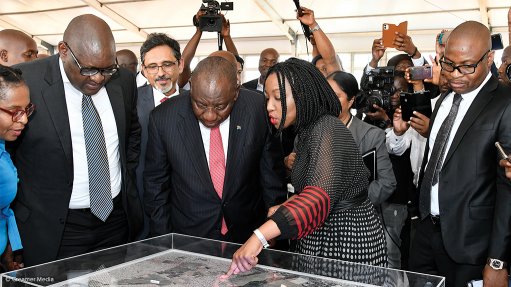
The groundbreaking ceremony at the Tshwane automotive SEZ in 2019
The Gauteng Growth and Development Agency (GDDA) has prioritised three special economic zone (SEZ) developments for roll-out in Gauteng, says GDDA CEO Mosa Tshabalala.
The first is a high-tech SEZ in the northern corridor of Gauteng, in Bronkhorstspruit, 50 km from Pretoria.
“This is especially because of what we learned through Covid-19,” says Tshabalala.
“The absence of a very intentional focus on and investment in technology and innovation is going to result in us as a country and continent not moving in the same direction as the rest of the world.
“We would continue to be a basket case that needs to receive instead of a bread basket that can offer in abundance. That high-tech SEZ is very critical [to the province].”
Tshabalala adds that the expansion of the automotive SEZ, also in the province’s northern corridor, is another of GDDA’s priorities, especially moving to Phase 2 and Phase 3 as quickly as possible.
The development of Phase 1 is already under way.
“The investment that must go into this project and the speed at which we do this development is important.”
The third SEZ to be prioritised is the Vaal SEZ.
“This is a great greenfield opportunity for as a province to ensure we create a thriving corridor again.
“The Vaal region was anchored by the steel industry for many years and that is no longer the case, which is why we see 56% youth unemployment in that region.”
She says the GDDA is to ensure that basic economic infrastructure is put in place, such as telecommunication networks, bulk infrastructure and roads.
“We cannot bring investors into a space where they cannot thrive and where they must incur costs to run their businesses.”
Tshabalala notes that the Covid-19 pandemic has caused disruption within the GDDA, as it has elsewhere, but adds that it “has also encouraged us to work faster”.
“It has forced us to ask how do we partner better in the public and private sector.
We are also looking at funding models. [Covid-19] showed us that government does not have enough funding to fund infrastructure projects on their own. So how do we prepare our pipeline of projects that they are attractive enough for investors?”
* Tshabalala spoke during a CNBC GDDA webinar.